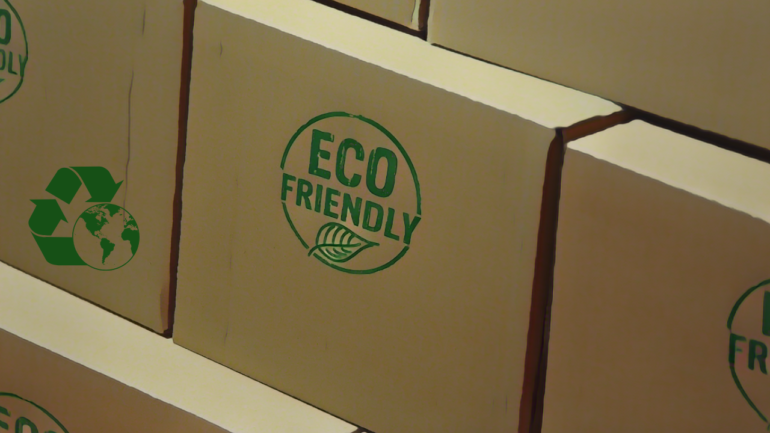Did you know that sustainable businesses see a 35% increase in profit margins? This is according to a report by Wharton. This shows how big of an impact sustainability has on business. Eco friendly entrepreneurs are leading the way, making money and helping the planet.
More and more people want to buy from companies that care about the environment. In fact, 66% of global consumers are willing to pay more for sustainable products. This is a great chance for new entrepreneurs to make a difference and earn trust.
This article will share lessons from successful eco-friendly entrepreneurs. We’ll look at their journeys, the changing market, and their winning strategies. You’ll learn how to make your business more sustainable and profitable.
Key Takeaways
- Sustainable businesses saw a 35% average increase in profit margins.
- 66% of consumers are willing to pay more for sustainable brands.
- Sustainability leaders achieve four times higher revenue growth on average.
- Companies with strong ethical commitments have a 50% higher likelihood of retaining loyal customers.
- Energy-efficient strategies can reduce costs by 20%.
Understanding Eco Friendly Entrepreneurship
Eco-friendly entrepreneurship means making businesses green from the start. It’s about being responsible for the environment while also meeting customer needs. Businesses that focus on being eco friendly use green business practices like renewable resources and reducing waste.
An IBM Institute for Business Value survey found that 62% of people want to buy things that are better for the planet. This shows that more people are looking for companies that care about the environment. In the fashion world, 94% of shoppers say they want to buy from brands that are good for the planet.

About 70% of job seekers think companies that care about the environment are more appealing. Millennials, who are 68% more likely to support brands that help the planet, show that caring for the environment is important. This means that being eco friendly can help businesses build trust and loyalty with customers.
Using ethical business practices makes companies more sustainable. A study by Capgemini Research Institute found that 77% of executives in retail think being green helps keep customers loyal. This shows that being eco-friendly can help businesses build strong relationships with their customers.
As businesses grow, adding eco friendly elements can give them an edge. Investors and customers are more likely to support companies that are green. Being eco-friendly is not just good for the planet; it’s also good for business in the long run.
Historical Context: The Rise of Sustainability in Business
The path to corporate sustainability started in the late 1800s. Back then, some industries started to cut down on pollution. But it wasn’t until the 1960s that things really picked up, thanks to growing environmental awareness and social movements.
In the 1980s, big companies started talking more about sustainability. This marked a big change in how businesses saw their impact on the planet.
Entrepreneurs have always led the way in sustainability. They created new products like organic food and renewable energy. The 1990s saw more people wanting to buy green products, thanks to government support and the Brundtland Report.
The 2000s brought a new understanding of sustainability. Terms like “triple bottom line” and “eco efficiency” became key for big companies. This decade also saw more research on sustainable business practices, highlighting the need to tackle climate change.
Today, we have important frameworks like the Energy Star program and LEED certification. These help businesses use less energy and build in an eco friendly way. The Global Reporting Initiative and the United Nations Global Compact also play big roles in promoting responsible business practices.

But, there’s a big challenge: greenwashing. This is when companies lie about their green efforts. The future of sustainability will focus on a balanced approach that includes growth, protecting the environment, and being socially responsible.
| Decade | Key Developments |
|---|---|
| Late 1800s | Recognition of pollution reduction needs |
| 1960s | Surge in environmental awareness and social movements |
| 1980s | Mainstreaming of sustainability among large corporations |
| 1990s | Growth of green consumerism and public policy support |
| 2000s | Transition from green labels to broader sustainability concepts |
Consumer Behavior and Sustainability Trends
Consumer behavior is changing fast, thanks to growing interest in sustainability. More people want to buy products that are good for the planet. A recent survey in the US showed that over 60% of people are willing to spend more for items with eco-friendly packaging.
This shows a big shift in how people make their buying choices. The demand for sustainable products is huge, even in the huge consumer packaged goods (CPG) market. It’s clear that both buyers and sellers are thinking more about the environment’s impact.

There’s a big gap between what people say they want and what they actually buy. Yet, products that highlight their environmental, social, and governance (ESG) efforts are growing fast. This shows that people are more likely to choose brands that care about the planet.
- 65% of consumers prefer to buy purpose-driven brands committed to sustainability.
- Two thirds of analyzed categories show faster growth for products with ESG related claims.
- Millennials are increasingly vocal in their preference for brands emphasising purpose and sustainability.
As people focus more on sustainability, businesses need to change how they operate. By matching their marketing and products to what eco-conscious consumers want, companies can stay ahead. It’s key for businesses to keep up with these trends to succeed in a more aware market.
| Trend | Consumer Response | Impact on Purchasing Decisions |
|---|---|---|
| Preference for Sustainable Products | 60% willing to pay more | Growth in sales for sustainable goods |
| Interest in ESG Claims | 78% find sustainable lifestyle important | Higher growth rates for ESG-labeled products |
| Millennial Influence | Strong preference for purpose-driven brands | Increased market share for aligned businesses |
Key Strategies from Successful Eco Friendly Entrepreneurs
Successful eco friendly entrepreneurs use many strategies to grow their businesses while protecting the environment. They focus on innovation and responsibility. This way, they meet consumer needs while caring for the planet.
Innovative Sustainable Product Development
Creating sustainable products is key for many eco-friendly businesses. They use materials that are good for the planet and meet consumer demands. For example, sustainable fashion brands use organic fabrics and support fair trade.
This shows their commitment to the environment. It also attracts customers who care about the planet and want to buy products that are good for it.
Effective Green Business Practices
Green business practices are important for sustainability. Entrepreneurs often use the triple bottom line model. This model balances profit, social good, and environmental impact.
They also work on making their supply chains better and reduce emissions. Using technology, like smart sensors, helps save resources and money. Teaching employees about sustainability creates a culture of care for the planet.
Sustainability in Business: Building Trust and Loyalty
Building trust through sustainability is key to success today. A big 78% of consumers value sustainability, looking for brands that are eco friendly and transparent. Sharing your sustainability journey connects with customers on a deeper level, building a real relationship.
Many people are willing to wait for eco-friendly home deliveries. Over half are even willing to pay more for sustainable products. This shows how important loyalty is for growing a sustainable business.
Brands must be honest to avoid misleading claims. The Changing Markets Foundation found 59% of environmental claims by European fashion companies were false. As green marketing rules get stricter, being open is more important than ever. Companies like Adidas and New Balance faced lawsuits for not being true to their sustainability promises.
As people get smarter about greenwashing, they trust third-party certifications more. Brands that are open and honest about their sustainability efforts stand out. Being clear and honest about your sustainable practices can really boost trust with your customers.
Green Initiatives that Drive Social Impact
Green initiatives are key to a sustainable future in business. They tackle environmental issues and positively affect society. Brands taking on corporate responsibility find that going green empowers communities and brings about change. The circular economy leads this effort, focusing on reducing waste and using resources wisely.
Examples of Successful Circular Economy Models
Many companies have made circular economy a part of their business. This shows the big impact it can have.
- Patagonia: This outdoor brand lets customers return used items for recycling or refurbishment. This way, materials are reused instead of thrown away.
- UncommonGoods: This company is known for its unique items. It has a “give back” program, where customers can donate to social causes with their purchases.
- Method: This brand focuses on sustainable personal care and cleaning products. Their products break down quickly, reducing harm to the environment.
Green initiatives boost a company’s responsibility and meet consumer demand. Studies show that many people prefer eco friendly products. Also, 63% of Americans want businesses to lead in environmental efforts. By focusing on sustainability, companies can attract investors and build a loyal customer base.
Using circular economy models shows that new ways can cut down waste and support sustainability. This has a big social impact. It makes a strong case for green initiatives in today’s business world.
Conclusion
To become an eco friendly entrepreneur, you need a mix of sustainability secrets, new ideas, and practical tips. Leading figures show that going green is more than a trend. It’s a big change in how businesses work.
By choosing sustainable ways, you help the planet and meet customer needs for green products. This makes your brand more appealing and keeps you ahead of the competition.
There are many resources for eco friendly entrepreneurs, like over 155,000 angel investors and 50,000 venture capitalists. They offer help and support for new ideas. You can get big savings on prototypes and free technical help worth $35,000.
As people become more eco-conscious, your green efforts could win you loyal customers. This can also help keep your team happy and working for you.
The future of sustainable business looks bright for those who focus on being eco friendly. By saving resources and reducing waste, you not only help the environment. You also make your business stronger and more successful in a world that cares about sustainability.
Now is the time to make a difference and reach your business goals. Start using eco friendly practices today.
FAQ
What is eco friendly entrepreneurship?
Eco friendly entrepreneurship means running a business that cares about the planet. It aims to lessen its impact on the environment while meeting customer needs.
Why is sustainability important in business?
Sustainability is key for businesses. It helps them reduce their environmental harm, gain customer trust, and help social causes. This leads to lasting success and market strength.
How can businesses implement sustainable practices?
Companies can go green by using renewable resources and adopting circular economy models. They can also use energy saving tech and ensure their supply chains are fair.
What are some successful examples of sustainable businesses?
Patagonia and UncommonGoods are great examples. They use circular economy ideas by asking customers to return items for recycling or fixing.
How does consumer behavior impact sustainability in business?
People’s choices are shaped by green trends. Many choose brands that care about the planet. This pushes companies to change their marketing to be more eco-friendly.
What role does transparency play in building consumer trust?
Being open about eco friendly efforts builds trust. It makes customers feel connected to the brand, boosting loyalty.
What are circular economy models?
Circular economy models aim to reuse and recycle materials. This cuts down on waste and promotes sustainability by creating a loop in business.
How can I start my own eco-friendly business?
To start an eco friendly business, first find a need in the market. Then, use green materials and practices. Lastly, create a plan that focuses on the environment and social good.


